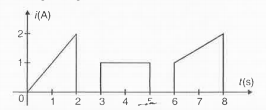Through a coil of resistance R charge is flowing in such a manner that in every time interval t0 the amount of charge flow is reduced by a factor of 1/2. If a total of q charge flows through the coil in very long time, then the total amount of heat generated in the coil will be
14t0q2Rloge2
32q2Rloge2t0
q2Rloge22t0
3q2Rloge24t0
The correct Answer is:C
To solve the problem step by step, we will analyze the situation of charge flowing through a coil of resistance R and how it relates to the heat generated in the coil.
Step 1: Understanding the Charge Flow
We are given that the charge flowing through the coil reduces by a factor of 12 every time interval t0. This indicates that the charge flow follows an exponential decay pattern, similar to radioactive decay.
Step 2: Expressing Current as a Function of Time
Since the charge reduces by half every t0, we can express the current I(t) as:
I(t)=I0e−λt
where λ=ln2t0 and I0 is the initial current.
Step 3: Relating Charge and Current
The total charge Q flowing through the coil can be expressed as:
Q=∫∞0I(t)dt
Substituting the expression for I(t):
Q=∫∞0I0e−λtdt
Step 4: Evaluating the Integral for Charge
Evaluating the integral:
Q=I0∫∞0e−λtdt=I0(−1λe−λt)∞0=I0(0+1λ)=I0λ
Thus, we have:
I0=Qλ
Step 5: Heat Generated in the Coil
The heat generated H in the coil can be calculated using:
H=∫∞0I2Rdt
Substituting I(t):
H=∫∞0(I0e−λt)2Rdt=RI20∫∞0e−2λtdt
Step 6: Evaluating the Integral for Heat
Evaluating the integral:
H=RI20(−12λe−2λt)∞0=RI20(0+12λ)=RI202λ
Step 7: Substituting I0 in Terms of Q
Now substituting I0=Qλ:
H=R(Qλ)22λ=Q2λR2
Step 8: Replacing λ
Since λ=ln2t0:
H=Q2Rln22t0
Final Answer
Thus, the total amount of heat generated in the coil is:
H=Q2ln22t0R
We are given that the charge flowing through the coil reduces by a factor of 12 every time interval t0. This indicates that the charge flow follows an exponential decay pattern, similar to radioactive decay.
Since the charge reduces by half every t0, we can express the current I(t) as:
I(t)=I0e−λt
where λ=ln2t0 and I0 is the initial current.
The total charge Q flowing through the coil can be expressed as:
Q=∫∞0I(t)dt
Substituting the expression for I(t):
Q=∫∞0I0e−λtdt
Evaluating the integral:
Q=I0∫∞0e−λtdt=I0(−1λe−λt)∞0=I0(0+1λ)=I0λ
Thus, we have:
I0=Qλ
The heat generated H in the coil can be calculated using:
H=∫∞0I2Rdt
Substituting I(t):
H=∫∞0(I0e−λt)2Rdt=RI20∫∞0e−2λtdt
Evaluating the integral:
H=RI20(−12λe−2λt)∞0=RI20(0+12λ)=RI202λ
Now substituting I0=Qλ:
H=R(Qλ)22λ=Q2λR2
Since λ=ln2t0:
H=Q2Rln22t0
Thus, the total amount of heat generated in the coil is:
H=Q2ln22t0R
Similar Questions
Knowledge Check
- Question 1 - Select One
The charge flowing through a resistance R varies with time t as Q=at−bt2. The total heat produced in R is
Aa3RbBa3R2bCa3R3bDa3R6b
Current passing through a wire decreases linearly from 10A to 0 in 4s. Find total charge flowing through the wire in the given time interval.
View SolutionThe plot represents the flow of current through a wire at three different times. The ratio of charges flowing through the wire at different time is
 View Solution
View SolutionA current of 3.6 A flows through an automobile headlight. How many coulombs of charge flow through the headlight in 3.0h?
View SolutionWhen starter motor of a car is switched on for 0.8s, a charge 24C passes through the coil of the motor. Calculate the current in the coil.
View SolutionThe plot represents the flow of current through a wire at three different times. The ratio of charges flowing through the wire at diffferent times is
 View Solution
View SolutionThe current flowing through wire depends on time as, I=3t2+2t+5
The charge flowing through the cross - section of the wire in time t=0 to t=2 second isView SolutionThe variation of current with time in a wire was shown in graph given below. Find amount of charge flowing in 6sec
View Solution

